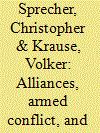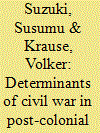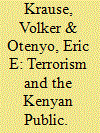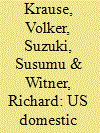|
|
|
Sort Order |
|
|
|
Items / Page
|
|
|
|
|
|
|
| Srl | Item |
| 1 |
ID:
072699


|
|
|
|
|
| Publication |
2006.
|
| Summary/Abstract |
Alliances are subject to many scholarly inquiries in international relations and peace research because they are major instruments of foreign and security policies. Since the early work on alliances produced by the Correlates of War (COW) project, there have been significant advances in conceptual, theoretical, and empirical alliance research. New typologies and data permit us to differentiate more thoroughly among a variety of alliance objectives and functions. Furthermore, there has been new theoretical and empirical research on alliance formation, alliance configuration/polarization, effects of alliances on military conflict, connections between alliances and trade, and the economics of alliances. Providing new theoretical approaches, data, and empirical evidence on alliances, this special issue includes articles that address alliance formation, alliance polarization, alliances and democratization, trade among allies, regional economic institutions with alliance obligations, and defense industrial policies of military alliances. The articles in this issue extend our understanding of alliances past the traditional realist balance-of-power framework and encourage further testing and refinement of older alliance arguments and extensions to new theoretical developments.
|
|
|
|
|
|
|
|
|
|
|
|
|
|
|
|
| 2 |
ID:
061012


|
|
|
| 3 |
ID:
060658


|
|
|
|
|
| Publication |
Mar-Apr 2005.
|
| Summary/Abstract |
Since 11 September 2001, terrorism has been a global security threat. One of the partners in the war on terrorism is Kenya. Considering Kenya"s recent experience with terrorist acts, their effects on its public psyche, and Kenya"s reactions to them in domestic and foreign policies, this study presents perceptions on terrorism from an exploratory survey in Kenya. Respondents feel most threatened not by terrorism but by AIDS and local criminals. Among terrorist acts, the most threatening include suicide terrorism, a plane crash, and stabbing attacks. Media reports on terrorism not only intensify feelings of anxiety and helplessness but also strengthen feelings for both peaceful and revengeful reactions. In order to prevent terrorist attacks, routine security checks, recognizing a Palestinian right to statehood, and intelligence collaboration with the CIA and Mosad are considered the most effective measures. Kenya"s commitment to the war on terrorism may be less a response to Kenyans" perceptions of terrorist threats than a policy to support the United States against terrorists in exchange for U.S. support against AIDS and for political stability, democracy, pluralism, and economic development.
|
|
|
|
|
|
|
|
|
|
|
|
|
|
|
|
| 4 |
ID:
075331


|
|
|
|
|
| Publication |
2006.
|
| Summary/Abstract |
Following previous scholarship on domestic sources of foreign policy, this study investigates the extent to which economic performance, political constraints, and other factors influence US international cooperation from 1953 through 1998. Using data on US international treaties and executive agreements, we estimate a set of event count models. We find that the US enters into more international treaties and executive agreements with increased inflation. There are fewer new international treaties and executive agreements under divided government and during a president's first year in office. Furthermore, there are fewer new international executive agreements during war involvement. Finally, the US substitutes international treaties and executive agreements for one another, and there are rising trends over time in the numbers of US international treaties and executive agreements.
|
|
|
|
|
|
|
|
|
|
|
|
|
|
|
|
|
|
|
|
|